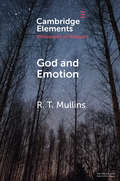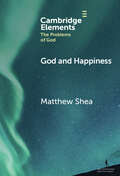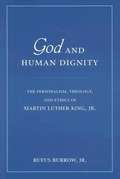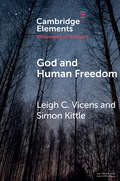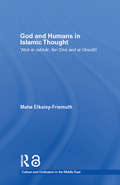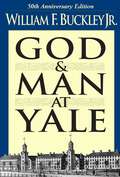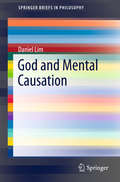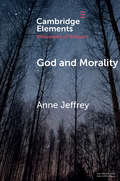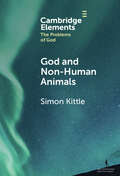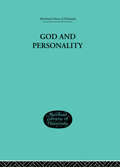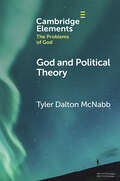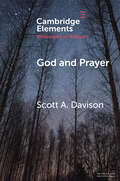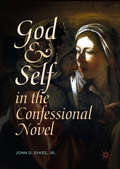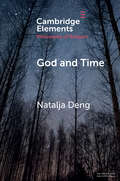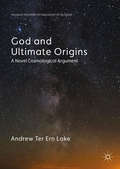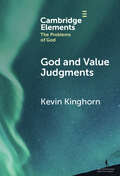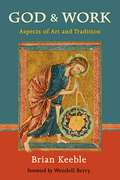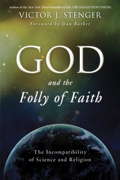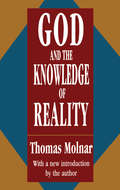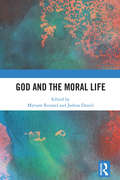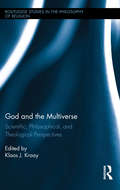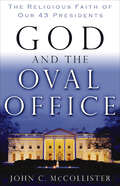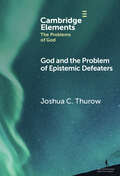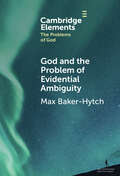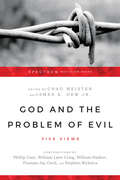- Table View
- List View
God and Emotion (Elements in the Philosophy of Religion)
by R. T. MullinsAn introductory exploration on the nature of emotions, and examination of some of the critical issues surrounding the emotional life of God as they relate to happiness, empathy, love, and moral judgments. Covering the different criteria used in the debate between impassibility and passibility, readers can begin to think about which emotions can be predicated of God and which cannot.
God and Happiness (Elements in the Problems of God)
by Matthew SheaThis Element explores the connection between God and happiness, with happiness understood as a life of well-being or flourishing that goes well for the one living it. It provides a historical and contemporary survey of philosophical questions, theories, and debates about happiness, and it asks how they should be answered and evaluated from a theistic perspective. The central topics it covers are the nature of happiness (what is it?), the content of happiness (what are the constituents of a happy life?), the structure of happiness (is there a hierarchy of goods?), and the possibility of happiness (can we be happy?). It argues that God's existence has significant, positive, and desirable implications for human happiness.
God and Human Dignity: The Personalism, Theology, and Ethics of Martin Luther King, Jr
by Rufus BurrowAlthough countless books have been devoted to the life and work of Martin Luther King, Jr. , few, if any, have focused on King's appropriation of, and contribution to, the intellectual tradition of personalism. Emerging as a philosophical movement in the early 1900s, personalism is a type of philosophical idealism that has a number of affinities with Christianity, such as a focus on a personal God and the sanctity of persons.
God and Human Freedom (Elements in the Philosophy of Religion)
by Leigh C. Vicens Simon KittleThis Element considers the relationship between the traditional view of God as all-powerful, all-knowing and wholly good on the one hand, and the idea of human free will on the other. It focuses on the potential threats to human free will arising from two divine attributes: God's exhaustive foreknowledge and God's providential control of creation.
God and Humans in Islamic Thought: Abd Al-Jabbar, Ibn Sina and Al-Ghazali (Culture and Civilization in the Middle East)
by Maha Elkaisy-FriemuthWinner of The Iranian World Prize for the Book of the Year 2007 in the Philosophy and Mysticism category. This new and original text provides a timely re-examination of Islamic thought, presenting a stark contrast to the more usual conservative view. The explanation of the relationship between God and humans, as portrayed in Islam, is often influenced by the images of God and of human beings which theologians, philosophers and mystics have in mind. The early period of Islam reveals a diversity of interpretations of this relationship. Elkaisy-Friemuth discusses the view of three scholars from the tenth and eleventh century: Abd al-Jabbar, Ibn Sina and Al-Ghazali, which introduce three different approaches of looking at the relationship between God and Humans. God and Humans in Islamic Thought attempts to shed light on an important side of medieval rational thought in demonstrating its significance in forming the basis of an understanding of the nature of God, the nature of human beings and the construction of different bridges between them.
God and Man at Yale: The Superstitions of 'Academic Freedom'
by William F. Buckley"For God, for country, and for Yale...in that order," William F. Buckley Jr. wrote as the dedication of his monumental work-a compendium of knowledge that still resonates within the halls of the Ivy League university that tried to cover up its political and religious bias. <P><P>Buckley's harsh assessment of his alma mater divulged the reality behind the institution's wholly secular education, even within the religion department and divinity school. Unabashed, one former Yale student details the importance of Christianity and heralds the modern conservative movement in his preeminent tell-all, God and Man at Yale: The Superstitions of "Academic Freedom."
God and Mental Causation
by Daniel LimThis book lies at the intersection of philosophy of mind and philosophy of religion and operates on the assumption that dialogue between the two disciplines can be fruitful. In particular it focuses on how debates in the philosophy of mind regarding the nature of mental causation relate to debates in the philosophy of religion regarding divine action, creaturely causation, and existence of God. The book is divided into two parts. The first deals with Jaegwon Kim's so-called Supervenience Argument (SA) against non-reductive physicalism. One important observation is that the structural similarities between non-reductive physicalism and 'orthodox' theism make it convenient to co-opt non-reductive physicalist solutions to the SA in defending the possibility of creaturely causation in the philosophy of religion. The SA is used as a foil to discuss the relative merits of Malebranche's so-called Conservation is Continuous Creation Argument for Occasionalism (CCCA). Moverover, the so-called compatibilist strategy (Karen Bennett 2003, 2009) for developing a non-reductive physicalist response to the Supervenience Argument is defended and developed. This strategy is then deployed in the philosophy of religion to defend the possibility of creaturely causation against the CCCA.
God and Morality (Elements in the Philosophy of Religion)
by Anne JeffreyThis Element has two aims. The first is to discuss arguments philosophers have made about the difference God's existence might make to questions of general interest in metaethics. The second is to argue that it is a mistake to think we can get very far in answering these questions by assuming a thin conception of God, and to suggest that exploring the implications of thick theisms for metaethics would be more fruitful.
God and Non-Human Animals (Elements in the Problems of God)
by Simon KittleThis Element explores the relevance of non-human animals to theology. It suggests that while Christian theology has so far been a thoroughly anthropocentric discipline, there are good reasons for treating animals as subjects worthy of theological reflection in their own right. The Element considers animals in the context of Christian ethics, investigates whether the violence and suffering found in evolutionary processes can be reconciled with a good God, and surveys some of the ways key theological doctrines may need to be altered in the light of what contemporary science teaches about human animals and non-humans.
God and Personality
by Clement C.J. WebbFirst published in 2002. This is Volume VII of seven in the Library of Philosophy series on the Philosophy of Religion. This volume is a collection of 10 Gifford lectures delivered at the University of Aberdeen in the years of 1918 and 1919 on the topic of God and personality.
God and Political Theory (Elements in the Problems of God)
by Tyler Dalton McNabbHow is God related to the state? Could the existence of robust political authority somehow be evidence for God? In this Element, the author explores these questions, pro and con, looking at various major positions. At the start of the volume, they defend a political argument for God's existence. Having motivated a theistic account of political authority, they then discuss the role God plays or could play in classical liberalism, Marxism, and postliberalism. While they sympathetically survey each political theory in turn, at the end of each section, they raise various objections to the view being discussed. Finally, at the end of the Element, the author articulates desiderata for theists who are looking for political frameworks.
God and Prayer (Elements in the Philosophy of Religion)
by Scott A. DavisonAre there good reasons for offering petitionary prayers to God, if God exists? Could such prayers make a difference in the world? Could we ever have good reason to think that such prayers had been answered? In this Element, the author will carefully explore these questions with special attention to recent philosophical discussions.
God and Self in the Confessional Novel
by John D. Sykes Jr.God and Self in the Confessional Novel explores the question: what happened to the theological practice of confession when it entered the modern novel? Beginning with the premise that guilt remains a universal human concern, this book considers confession via the classic confessional texts of Augustine and Rousseau. Employing this framework, John D. Sykes, Jr. examines Goethe’s The Sorrows of Young Werther, Dostoevsky’s Notes from Underground, Percy’s Lancelot, and McEwan’s Atonement to investigate the evolution of confession and guilt in literature from the eighteenth century to the early twenty-first century.
God and Time (Elements in the Philosophy of Religion)
by Natalja DengThe God of Western religion is said to be eternal. But what does that mean? Is God somehow beyond time, living a life that does not involve one thing after another? Or is God's relationship to time much more like ours, so that God's eternality just consists in there being no time at which God doesn't exist? Even for non-believers, these issues have interesting implications for the relation between historical and scientific findings on the one hand, and religion on the other. This Element introduces the reader to the requisite metaphysical background, and then examines reasons for and against thinking of God as timeless.
God and Ultimate Origins: A Novel Cosmological Argument (Palgrave Frontiers in Philosophy of Religion)
by Andrew Ter Ern LokeThis book develops a novel argument which combines the Kalam with the Thomistic Cosmological Argument. It approaches an ongoing dispute concerning whether there is a First Cause of time from a radically new point of view, namely by demonstrating that there is such a First Cause without requiring the controversial arguments against concrete infinities and against traversing an actual infinite (although the book presents original defenses of these arguments as well). This book also develops a novel philosophical argument for the Causal Principle, namely that 'everything that begins to exist has a cause', and offers a detailed discussion on whether a First Cause of time can be avoided by a causal loop. It also addresses epistemological issues related to the Cosmological Argument which have been relatively neglected by recent publications, and demonstrates (contra Hawking et al) the continual relevance and significance of philosophy for answering ultimate questions.
God and Value Judgments (Elements in the Problems of God)
by Kevin KinghornHumans continually make judgments that some things have more value than others. Plausibly, it is largely through our value judgments that God intends to guide us in setting priorities and goals. This Element surveys leading accounts of what value judgments are exactly. It then explores the particular values we are apparently sensitive to when making two judgments endemic to human life: about what makes a life good, and about who deserves a good life. Connections are made between differing analyses of human value judgments and views about God's character and the goals God is prompting us to pursue.
God and Work: Aspects of Art and Tradition
by Brian KeebleThis book is a compilation of Keeble''s insightful essays dealing with the oft-neglected relationship between God and work, spirituality and art, as well as contemplation and action. In the midst of the fast-paced modern world, it addresses the question, how can work become a form of prayer? Keeble focuses on artists and craftsmen such as poet and engraver William Blake, calligrapher Edward Johnston, sculptor Eric Gill, and key figures of the Arts and Crafts movement in Britain.
God and the Folly of Faith
by Victor J. StengerA thorough and hard-hitting critique that is a must read for anyone interested in the interaction between religion and science.It has become the prevalent view among sociologists, historians, and some theistic scientists that religion and science have never been in serious conflict. Some even claim that Christianity was responsible for the development of science. In a sweeping historical survey that begins with ancient Greek science and proceeds through the Renaissance and Enlightenment to contemporary advances in physics and cosmology, Stenger makes a convincing case that not only is this conclusion false, but Christianity actually held back the progress of science for one thousand years. It is significant, he notes, that the scientific revolution of the seventeenth century occurred only after the revolts against established ecclesiastic authorities in the Renaissance and Reformation opened up new avenues of thought. The author goes on to detail how religion and science are fundamentally incompatible in several areas: the origin of the universe and its physical parameters, the origin of complexity, holism versus reductionism, the nature of mind and consciousness, and the source of morality. In the end, Stenger is most troubled by the negative influence that organized religion often exerts on politics and society. He points out antiscientific attitudes embedded in popular religion that are being used to suppress scientific results on issues of global importance, such as overpopulation and environmental degradation. When religion fosters disrespect for science, it threatens the generations of humanity that will follow ours.
God and the Knowledge of Reality
by Thomas MolnarWritten simply yet comprehensively, Molnar's anlaysis of the history of philosophy and false mysticism leads him to conclude that a return to a moderate realism will save the philosophical enterprise from a series of epistemological and societal absolutes that are embodied in contemporary rationalism and mysticism alike. Issues that have been systematically excluded from discourse will have to be reintroduced into the discussion of person and providence Molnar divided the philosophical systems into two groups according to their vision of God, and consequently of reality One group removes God from the human scope, therefore rendering the world unreal, unknowable, and meaningless. The second group holds that God is immanent in the human soul, thereby emphasizing the human attainment of divine status, and reducing the extra-mental world to a condition of utter imperfection. Either way, the result is a pseudo-mysticism, a denial of the creaturely status of human beings What is most needed, Molnar claims, is a theory of knowledge whose ideal is not fusion but distinction-between God and Man, subject and object, the self and the society. By thus raising the question of philosophy over against magic Molnar seeks to awaken the reader from neo-dogmatic assumptions and restore speculative thought to its traditional place.
God and the Moral Life
by Myriam Renaud Joshua DanielHow do various concepts of God impact the moral life? Is God ultimately required for goodness? In this edited collection, an international panel of contemporary philosophers and theologians offer new avenues of exploration from a theist perspective for these important questions. The book features several approaches to address these questions. Common themes include philosophical and theological conceptions of God with reference to human morality, particular Trinitarian accounts of God and the resultant ethical implications, and how communities are shaped, promoted, and transformed by accounts of God. Bringing together philosophical and theological insights on the relationship between God and our moral lives, this book will be of keen interest to scholars of the philosophy of religion, particularly those looking at ethics, social justice and morality.
God and the Multiverse: Scientific, Philosophical, and Theological Perspectives (Routledge Studies in the Philosophy of Religion)
by Klaas KraayIn recent decades, scientific theories have postulated the existence of many universes beyond our own. The details and implications of these theories are hotly contested. Some philosophers argue that these scientific models count against the existence of God. Others, however, argue that if God exists, a multiverse is precisely what we should expect to find. Moreover, these philosophers claim that the idea of a divinely created multiverse can help believers in God respond to certain arguments for atheism. These proposals are, of course, also extremely controversial. This volume collects together twelve newly published essays – two by physicists, and ten by philosophers – that discuss various aspects of this issue. Some of the essays support the idea of a divinely created multiverse; others oppose it. Scientific, philosophical, and theological issues are considered.
God and the Oval Office: The Religious Faith of Our 43 Presidents
by John C. McCollisterA look into how the temporary residents of the White House expressed the deepest of all human feelings—personal religious faith—in their own words.“We need to remember that the separation of church and state must never mean the separation of religious values from the lives of public servants.” —Lyndon B. Johnson“So help me God.” George Washington added those words to the presidential oath, and every president since has followed suit. Whether their faith was devout or doubted, heartfelt or pragmatic, John McCollister plumbs America’s strong and deep spiritual heritage, showing the fascinating and vital role faith played in the lives of each of our forty-three presidents:Thomas Jefferson’s “edited” version of the GospelsAbraham Lincoln’s unique approach to organized religionAndrew Johnson’s “secret” CatholicismJames Garfield’s personal sacrifice of the pulpit for the presidencyDwight Eisenhower’s trust in God’s sovereigntyRonald Reagan’s profound sense of forgivenessGeorge W. Bush’s unapologetic faith in Jesus ChristFrom George Washington to George W. Bush, most of our country’s chief executives have turned to God for assurance, guidance, and hope. Through what they learned in the Bible, bolstered by strength found in prayer, they have led America to become the greatest nation on earth. Timely and timeless, God and the Oval Office tells their story.
God and the Problem of Epistemic Defeaters (Elements in the Problems of God)
by Joshua ThurowAny modern, moderately intellectually mature (MMIM) believer in God faces a variety of epistemic defeaters of their belief in God. Epistemic defeaters challenge the rationality of a belief. After explaining the notion of a defeater and discussing various ways and targets of defeat, this Element categorizes the many defeaters of belief in God into four classes: rebutting, undercutting, base defeaters, and competence defeaters. Then, several general defeaters of theistic belief are examined in some detail: the superfluity argument, the problem of unpossessed evidence, various forms of debunking arguments, and a cumulative case competence defeater. The typical MMIM believer, it is argued, has resources to resist these defeaters, although the cumulative case competence defeater has some force. The strength of its force depends on the strength of grounds for theistic belief and of various defeaters and deflectors for the competence defeater. No easy general defeater of theistic belief is found.
God and the Problem of Evidential Ambiguity (Elements in the Problems of God)
by Max Baker-HytchWhen it comes to what many of us think of as the deepest questions of existence, the answers can seem difficult to make out. This difficulty, or ambiguity, is the topic of this Element. The Element begins by offering a general account of what evidential ambiguity consists in and uses it to try to make sense of the idea that our world is religiously ambiguous in some sense. It goes on to consider the questions of how we ought to investigate the nature of ultimate reality and whether evidential ambiguity is itself a significant piece of evidence in the quest.
God and the Problem of Evil: Five Views (Spectrum Multiview Book Series)
by Chad Meister James K. Dew Jr.Evil abounds. And so do the attempts to understand God in the face of such evil.God and the Problem of EvilPhillip Cary: A Classic ViewWilliam Lane Craig: A Molinist ViewWilliam Hasker: An Open Theist ViewThomas J. Oord: An Essential Kenosis ViewStephen Wykstra: A Skeptical Theism ViewGod and the Problem of Evil
